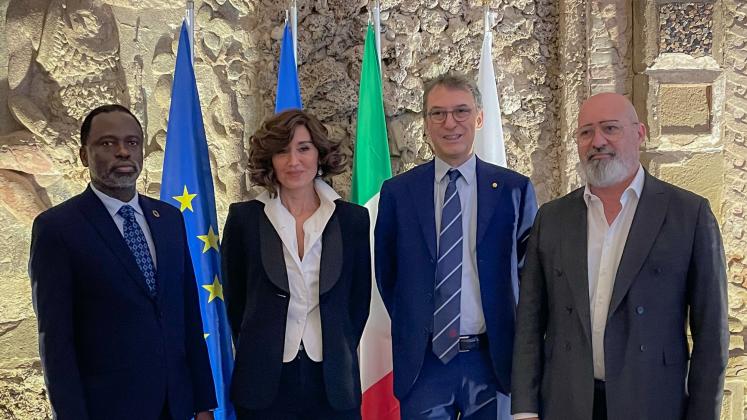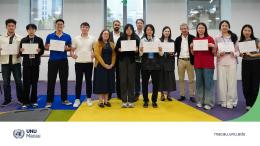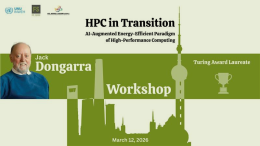Tokyo, Japan ― The United Nations University (UNU) is pleased to announce today that it will establish a research and training institute in Bologna, Italy. The new institute, made possible through the generous support and cooperation of the Italian government and the Emilia-Romagna Region, will catalyse global collaboration and innovation in the utilization of big data and artificial intelligence (AI) to manage human habitat change.
Following a successful 2022 feasibility study by a team of international experts that confirmed the potential for creating a UNU institute focused on harnessing the power of big data and AI, the Italian government has pledged a significant contribution of USD 40 million to the UNU Endowment Fund to ensure the institute’s long-term sustainability. Moreover, the Italian government and the Emilia-Romagna Region will share the allocation of EUR 2.5 million per year to cover operational expenditures of the institute for an initial period of 10 years.
This UNU institute will be housed in a new building now being constructed within Bologna’s Technopole, a rapidly expanding research hub known for its state-of-the-art facilities and innovation ecosystem. Pending the necessary approvals by Italian authorities and staff recruitment, the institute could begin operations as early as the 2nd half of 2024.
The launch of the new UNU institute in Bologna will mark a significant milestone in leveraging the potential of big data and AI to address issues of human habitat change. Among the areas in which the new institute could contribute to policy-relevant research and training delivery are climate change, disaster reduction, and crisis and conflict management.
Through strategic collaborations with other United Nations entities, the institute will play a pivotal role in accelerating UN efforts to mobilize big data and AI-driven insights to achieve the Sustainable Development Goals. Moreover, by engaging with researchers and policymakers from the global South, the new institute will ensure that its projects and collaborations address the needs and aspirations of countries and peoples worldwide.
“Artificial intelligence and big data stand poised to reshape our world, either for better or worse. So that we can guide their expeditious development, it is imperative that we better understand the potential applications and impacts,” said UNU Rector Tshilidzi Marwala. “To fulfil our mandate of helping to solve pressing global problems, UNU must keep pace with the evolving nature of global needs. The establishment of this new institute, which will focus on AI and big data in the context of the changing human habitat, is a step along that path.”
The new UNU institute will benefit from the Emilia-Romagna Region’s thriving innovation ecosystem by providing access to a rich community of researchers, advanced supercomputing facilities, and robust cloud infrastructure. This positioning will enable the institute to emerge as a global hub for pioneering research, policy development, and interdisciplinary collaboration.
On 12 June, representatives of the main stakeholders and international experts in the fields of big data and AI participated in a workshop in Bologna to further define the institute's mandate and scope and discuss how to achieve optimal inter-regional collaboration and knowledge exchange.
The establishment of this new UNU institute in Bologna heralds a new era of collaboration, innovation, and knowledge creation in the realm of Big Data and AI, and promises to contribute to the advancement of global cooperation and the achievement of a sustainable and equitable future.
For media inquiries, please contact:
Kyra Bowman
Head of Communications, UNU
bowman@unu.edu
Yukiko Nakahari
Japan Communications Specialist, UNU
y.nakahari@unu.edu
Joint Statement by the Government of Italy, the Emilia Romagna Region, and the United Nations University Regarding the Establishment of a New UNU Institute in Bologna, Italy
We, the representatives of the United Nations University and of the Ministry of Foreign Affairs and International Cooperation of Italy, together with the Ministry of University and Research, Emilia Romagna Region and University of Bologna, met in Bologna on June 12 to launch the Scoping Workshop “Towards a new UNU institute on Big Data and Artificial Intelligence for Managing Human Habitat Change”.
We are pleased to announce the pending establishment of a new United Nations University (UNU) institute in Bologna, Italy. Harnessing the power of big data and artificial intelligence for managing human habitat change, the institute will leverage the use of cutting-edge digital technologies to help solve pressing global challenges and foster international collaboration.
The establishment of the new UNU institute is possible thanks to the generous support of the Government of Italy and the Emilia-Romagna Region. In line with its strong commitment to multilateralism and support to the United Nations (UN) towards the achievement of the Sustainable Development Goals, the Italian government has committed USD 40 million to the UNU Endowment Fund as well as an annual contribution shared with the Emilia-Romagna region of EUR 2.5 million during the first decade of the institute's operation.
Earlier this month, the UNU Governing Board authorised the Rector to begin negotiating the agreements necessary for the establishment and operation of the institute. In anticipation of the establishment, Italy financed the construction of a new building to house the institute within Bologna’s Technopole, a state-of-the-art and fast-growing research hub in Italy.
The selection of Bologna as the host city for the institute is both deliberate and strategic. The region's thriving innovation ecosystem, access to distinguished researchers, supercomputing facilities, and cloud infrastructure offer an ideal environment for the institute’s operation, and dynamic synergies with local institutions, industry partners, and the wider community will amplify the institute's impact and influence.
By advancing global research, development, and policy in the domains of big data and artificial intelligence, the institute will cooperate with other UNU and UN entities to deliver data-driven insights and catalyse innovation that can contribute to achievement of the UN Development Agenda. Central to the institute’s work will be active collaboration and engagement with institutions and researchers in the Global South to ensure that UNU’s work genuinely addresses the diverse needs and aspirations of nations and peoples worldwide, in line with the spirit of the many UN agencies and UN-backed research centres hosted in Italy.
In this workshop, UNU and UN representatives, national and regional government officials, and a panel of international experts will confer to more precisely outline the institute's scope and mandate and determine how to achieve optimal inter-regional collaboration and knowledge exchange.
We are embarking on a journey with the goal of using digital technologies to shape a more sustainable and equitable future for all. Thank you all for your continued support as we set forth on this exciting endeavour.






